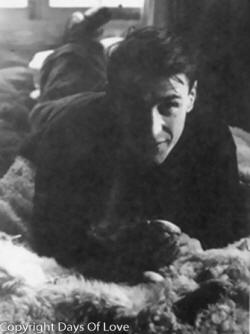
Partner Denton Welch

For nearly half a century Eric Oliver (October 6, 1914 - April 1, 1995) basked in the reflected glory of having lived with the writer Denton Welch for the last four years of his life.
Eric Oliver was born in Bromley, Kent, on 6 October 1914 and died in Portslade, East Sussex, on 1 April 1995.
Oliver was introduced to Welch in November 1943 at a time when Oliver, a conscientious objector, was working on the land and Welch was living as a semi-invalid, following a disastrous road accident when he was 20, near Hadlow, in Kent. "After you left the other night," Welch wrote to the painter Nol Adeney, "who should appear but Francis [Streeten, one of Welch's more eccentric acquaintances] and a new hearty land-boy friend! The land-boy kept suggesting that I should get up and go out and have a drink with him! As I was almost a corpse by then, I could not oblige." He elaborated in his Journals: "I tried to be very bright; but it was an awful strain. They had been drinking in a pub and had come on to me later. They were still mildly redolent of the pub and beer."
Despite Oliver's boozy and often hurtful conduct, Denton Welch fell in love with him. The intensity of Welch's emotions was not returned, for on his own admission Oliver was incapable of love ("You must never take me seriously," he wrote in the only letter of his to Welch which survives), but, once they had sorted out the imbalance in their relationship, Oliver moved in with him, and as Welch's physical condition deteriorated Oliver nursed him with practical expertise.
On the face of it, Eric Oliver seemed an incongruous choice of companion for a writer and painter as fastidious as Denton Welch. "It is just because you are different that I like you," Welch wrote to him in February 1944. "You wouldn't touch my imagination in the very least if you approximated more to my type." Oliver was virtually illiterate, and had little judgement about people, art or business. As Welch's residuary beneficiary on his death at the tragically early age of 33 (inheriting about £5,000), he appointed himself his literary executor, but parted with the copyrights of Welch's works to a bookseller who promptly resold them to the University of Texas. Oliver always maintained that he did not understand what he was signing.
Eric Oliver was six months Denton Welch's senior (though when they first met Welch lied to him about his age, knocking off a couple of years, a conceit Oliver continued to perpetrate even after Welch's death). He was born in 1914, the fifth of sixth children; his eldest brothers had all been educated at Dulwich, but Eric failed the Common Entrance examination, and his formal education ceased when he was 13. He drifted from job to job, and spent much of his time at race meetings and dog tracks. In late middle age he was finally located working in the mortuary of Brighton General Hospital.
Welch relied heavily upon Oliver, and not just as a nurse; only four months before his death in 1948, the pair of them were proof-reading Welch's first collection of short stories, Brave and Cruel, published posthumously in 1949. When Welch died on 30 December, in Oliver's arms, the manuscript of his third and finest novel, A Voice Through a Cloud, lay by the bed, and Oliver was instrumental in John Lehmann's publishing it in 1950, with a foreword signed by Oliver but probably written by Lehmann. Lehmann was rewarded for publishing both this novel and a second collection of short stories, A Last Sheaf (1951), by being asked to take care of one of Denton Welch's chests, in a drawer of which he was somewhat shocked to discover an urn containing the writer's ashes. Oliver kept them for many years in his wardrobe, until he was persuaded to hand them over for safekeeping to a clergyman. His only reminder of Welch thereafter was a cigarette case Welch had given him as a birthday present. This he sold for £50 to a young American journalist who wanted to give it to William S. Burroughs.
Where Denton Welch was homosexual, Eric Oliver was without sexual morals or preferences. No sexual exploit initiated by him, however, ever superseded in audacity his conquest, shortly after Welch's death, of their 55-year- old housekeeper, Evie Sinclair; he divested her of her virginity in the bath.
Welch made good literary use of Oliver by turning him into two characters in short stories, Trevor Pinkston in "The Hateful Word" and Tom Parkinson in "The Diamond Badge", both published posthumously in A Last Sheaf. Nol Adeney, who was obsessively jealous of Eric Oliver, put him in her venomous autobiographical novel No Coward Soul (1956), but gave him a sex-change. He emerges as a Fascist, clod- hopping land-girl. Asked how he felt about this libel, Oliver gave the typically laconic reply, "It is better to be looked over than overlooked!"
After the story of their often stormy relationship was told in my biography Denton Welch: the making of a writer (1984), letters constantly arrived from Welch enthusiasts asking if Eric Oliver were still alive and, if so, where he was living. They would beat a path to his flat in Portslade, near Brighton, as if on pilgrimage. Oliver said that knowing Denton Welch was the most important thing that ever happened to him.
My published books: